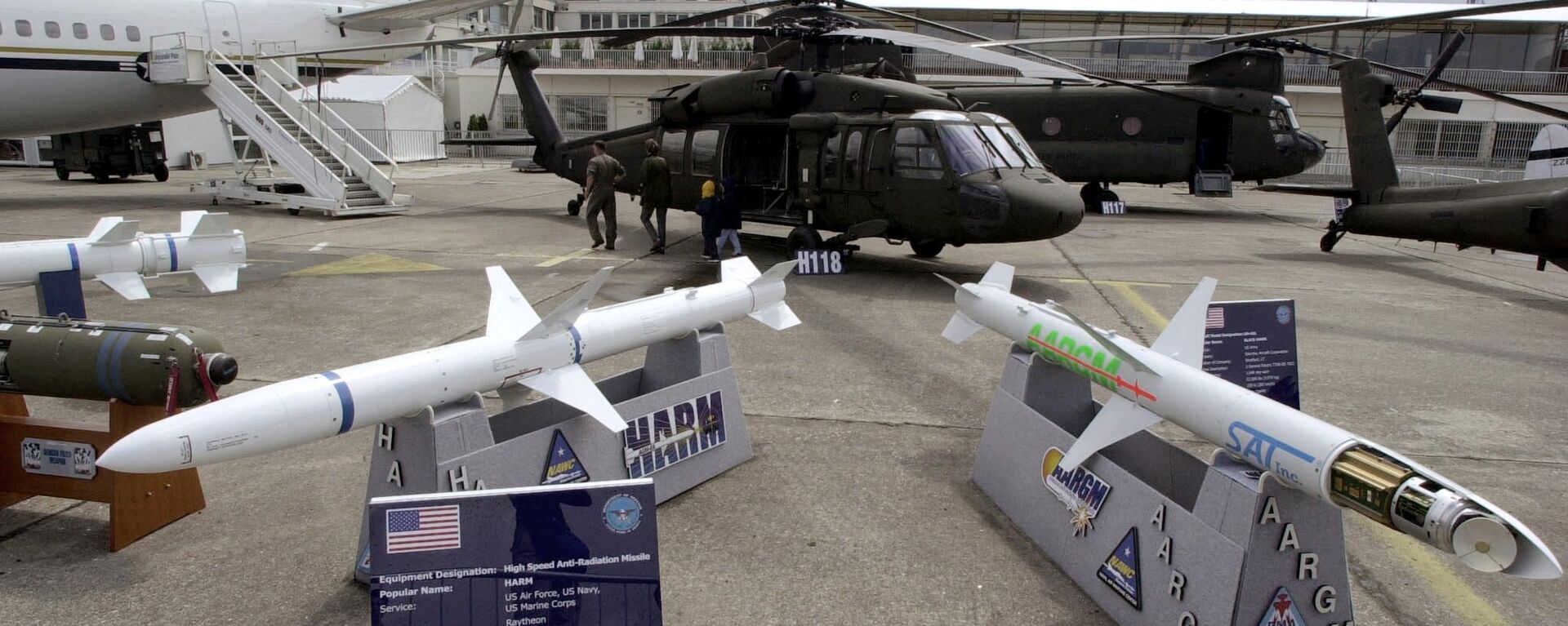https://sputnikglobe.com/20231028/us-weapons-production-deficiency-exposed-amid-ukraine-israel-conflicts-1114546283.html
US Weapons Production Deficiency Exposed Amid Ukraine, Israel Conflicts
US Weapons Production Deficiency Exposed Amid Ukraine, Israel Conflicts
Sputnik International
Biden's support for Ukraine has revealed US military shortfall: the limited capacity of its defense industry to ramp up output. The Palestinian-Israeli conflict complicates this problem as American arms production struggles to meet rising demands. leading military experts to question the US's ability to honor its aid commitments while maintaining its own combat readiness.
2023-10-28T14:00+0000
2023-10-28T14:00+0000
2023-10-28T14:00+0000
military
us
joe biden
ukraine
israel
east
pentagon
hamas
https://cdn1.img.sputnikglobe.com/img/07e6/09/07/1100517404_0:234:3072:1962_1920x0_80_0_0_9de663060c054bc12e43e65bbbcc8a40.jpg
While the Biden administration has reaffirmed its support for Ukraine and Israel in the latest escalation in the Gaza Strip and, at the same time, prioritized American security, experts have been skeptical about it.Furthermore, a senior fellow at the Brookings Institution and a foreign policy expert, Michael O’Hanlon, told a US media outlet that “Any kind of a blanket statement like ‘we can handle this, we got it’ is too simplistic.” The expert further contends that even if the Pentagon or President Joe Biden’s administration has a point, it is a misrepresentation to describe their stance as an unquestionable fact.In a recent prime-time speech, President Biden pledged to send more military aid to Ukraine and Israel, seeking Congress' approval for a $105 billion emergency package. Ukraine is set to get around $61 billion, while Israel will receive about $14 billion for air and missile defenses. Since March 2022, the US has sent billions' worth of weapons to fuel its proxy war against Russia in Ukraine, thereby depleting its weapons at rates reportedly unseen since World War II. Moreover, US stockpile replenishment faces challenges as manufacturers cannot cope with demand. This was evident when the Department of Defense redirected tens of thousands of 155 mm artillery shells intended for Ukraine to Israel as the Palestinian-Israeli conflict kicked in. Future supplies to Israel may comprise artillery and bombs similar to those which Ukraine used, including Stinger missiles.Matthew Kroenig, director of the Atlantic Council’s Scowcroft Center for Strategy and Security, said in an interview with the outlet that “the reality is that we really don’t have the force, the munitions, or the defense industrial base” to maintain pace with US security interests in Asia, Europe, and the Middle East. “That’s a problem,” he noted.Kroenig asserts that since the end of the Cold War when the US stashed munitions expecting a conflict with the Soviet Union, the US industrial base has shrunk.After the Cold War, Washington prioritized weapons efficiency over production capacity. This approach has jeopardized the US' ability to defend its security interests.During an on-camera press briefing on Tuesday, DoD Press Secretary Brig. Gen. Pat Ryder informed reporters that the US believes in its capacity to cater to the needs of both Israel and Ukraine while maintaining their military readiness. Additionally, he mentioned that defense officials are collaborating with the industry domestically and internationally, particularly with allies, to enhance the production of 155 mm shells.Nevertheless, mounting concerns loom over the possibility of prolonged conflicts. As the Ukraine conflict trudges into its second year, Israel is gearing up for a potentially drawn-out ground assault in Gaza.
https://sputnikglobe.com/20221218/ukraine-conflict-fears-over-alleged-russian-threat-boost-us-capacity-to-produce-weapons-report---1105568832.html
ukraine
israel
east
Sputnik International
feedback@sputniknews.com
+74956456601
MIA „Rossiya Segodnya“
2023
Chimauchem Nwosu
https://cdn1.img.sputnikglobe.com/img/07e7/09/01/1113046371_0:99:1536:1635_100x100_80_0_0_9c5c627283eca931c39fe4852bbb301c.jpg
Chimauchem Nwosu
https://cdn1.img.sputnikglobe.com/img/07e7/09/01/1113046371_0:99:1536:1635_100x100_80_0_0_9c5c627283eca931c39fe4852bbb301c.jpg
News
en_EN
Sputnik International
feedback@sputniknews.com
+74956456601
MIA „Rossiya Segodnya“
Sputnik International
feedback@sputniknews.com
+74956456601
MIA „Rossiya Segodnya“
Chimauchem Nwosu
https://cdn1.img.sputnikglobe.com/img/07e7/09/01/1113046371_0:99:1536:1635_100x100_80_0_0_9c5c627283eca931c39fe4852bbb301c.jpg
us military, department of defense, palestinian-israeli conflict, american arms production, conflict in ukraine, us proxy war against russia in ukraine, us security interests, hamas, gaza.
us military, department of defense, palestinian-israeli conflict, american arms production, conflict in ukraine, us proxy war against russia in ukraine, us security interests, hamas, gaza.
US Weapons Production Deficiency Exposed Amid Ukraine, Israel Conflicts
Biden's support for Ukraine has revealed the limited capacity of the US defense industry to increase output. The Palestine-Israel conflict complicates this problem, as American arms production struggles to meet demand. Leading military experts are questioning the US’ ability to honor its aid commitments while maintaining its own combat readiness.
While the Biden administration has reaffirmed its support for Ukraine and Israel in the latest escalation in the Gaza Strip and, at the same time, prioritized American security, experts have been skeptical about it.
Furthermore, a senior fellow at the Brookings Institution and a foreign policy expert, Michael O’Hanlon, told a US media outlet that “Any kind of a blanket statement like ‘we can handle this, we got it’ is too simplistic.” The expert further contends that even if the Pentagon or President Joe Biden’s administration has a point, it is a misrepresentation to describe their stance as an unquestionable fact.
In a recent prime-time speech, President Biden pledged to send more military aid to Ukraine and Israel, seeking Congress' approval for a $105 billion emergency package. Ukraine is set to get around $61 billion, while Israel will receive about $14 billion for air and missile defenses.
Since March 2022, the US has sent billions' worth of weapons to fuel its proxy war against Russia in Ukraine, thereby depleting its weapons at rates reportedly unseen since World War II. Moreover,
US stockpile replenishment faces challenges as manufacturers cannot cope with demand. This was evident when the Department of Defense redirected tens of thousands of 155 mm artillery shells intended for Ukraine to Israel as the Palestinian-Israeli conflict kicked in. Future supplies to Israel may comprise artillery and bombs similar to those which Ukraine used, including Stinger missiles.

18 December 2022, 15:05 GMT
Matthew Kroenig, director of the Atlantic Council’s Scowcroft Center for Strategy and Security, said in an interview with the outlet that “the reality is that we really don’t have the force, the munitions, or the defense industrial base” to maintain pace with US security interests in Asia, Europe, and the Middle East. “That’s a problem,” he noted.
Kroenig asserts that since the end of the Cold War when the US stashed munitions expecting a conflict with the Soviet Union, the US industrial base has shrunk.
After the Cold War, Washington prioritized weapons efficiency over production capacity. This approach has jeopardized the US' ability to defend its security interests.
“With the war in Ukraine, people were saying, ‘Well, we need to be focused on China. We can’t give these munitions to Ukraine.’ Layer on top of that, we’re now providing aid to Israel; I think it is going to be a real challenge,” remarked Kroenig.
During an
on-camera press briefing on Tuesday, DoD Press Secretary Brig. Gen. Pat Ryder informed reporters that the US believes in its capacity to cater to the needs of both Israel and Ukraine while maintaining their military readiness. Additionally, he mentioned that defense officials are collaborating with the industry domestically and internationally, particularly with allies, to enhance the production of 155 mm shells.
Nevertheless, mounting concerns loom over the possibility of prolonged conflicts. As the Ukraine conflict trudges into its second year, Israel is gearing up for a potentially drawn-out ground assault in Gaza.




